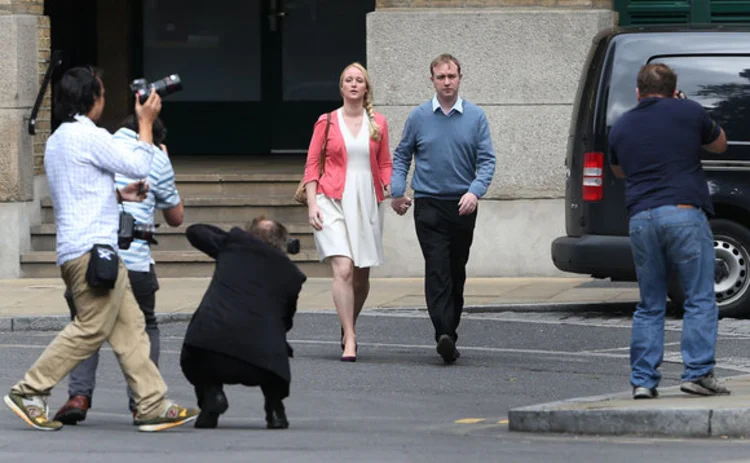
Libor rigger Hayes jailed for 14 years
Tom Hayes found guilty of manipulating Libor while at UBS and Citi

Updates with sentencing, comments from judge and defence, background
Tom Hayes, a former UBS and Citi trader, was sentenced to 14 years in jail today (August 3) after a London jury found him guilty of all eight charges of conspiracy to defraud between 2006 and 2010 in the Libor-rigging scandal.
Today's verdict and sentencing bring to a close the first criminal case against an individual related to the manipulation of the benchmark interest rate, linked to the pricing of hundreds of trillions of dollars' worth of financial products such as loans and mortgages around the world.
Six banks have already admitted rigging Libor and paid settlements of about $6.5 billion to regulators, while a number of other individuals face criminal proceedings or are being investigated.
"The conduct involved here is to be marked out as dishonest and wrong. And a message needs to be sent to the world of banking accordingly," the judge, Jeremy Cooke, told Hayes during sentencing. "What this case has shown is the absence of that integrity which ought to characterise banking."
Hayes's defence lawyer Neil Hawes urged the judge to "balance" Hayes's actions against the broader backdrop of how Libor was seen at the time, when it was an unregulated product. "The conduct Mr Hayes is being convicted of was prevalent for at least five years prior to [the] commencement of his activities."
But Cooke said "the fact that others were doing it is no excuse" and neither was the fact that his senior managers condoned and encouraged it. "The offences were thought-through and regular," he told Hayes today. "In short, these are offences of high culpability."
Libor trial: previous coverage
Day-by-day coverage of Tom Hayes Libor trial
Throughout the trial, which began on May 26, the prosecution argued that Hayes colluded with a number of individuals at banks and brokers to manipulate the Japanese yen Libor rate, which ultimately benefited his trading book at the expense of counterparties.
Hayes, a 35-year-old British national, worked at the Tokyo office of UBS from September 2006 to mid-2009. He was then poached by Citi in December 2009 and began trading in the US bank's Tokyo office in February 2010. He was dismissed in September 2010 following an internal investigation into his activities around Libor.
Following his arrest in December 2012, Hayes spent five months being interviewed by the UK's Serious Fraud Office (SFO), admitting dishonesty, and was subsequently charged in June 2013.
But he told the court on the witness stand that he only did so to avoid extradition to the US, where he had been indicted for similar criminal offences. Hayes withdrew from a co-operation agreement with the SFO and in December 2013 pleaded not guilty. However, Cooke said he did not use the withdrawal to lengthen Hayes's sentence.
During the 10-week trial the court heard excerpts from telephone conversations and transcripts of electronic chats between Hayes, his colleagues at UBS and Citi and traders from other banks, as well as brokers, whom the prosecution says he regularly rewarded for their help influencing various submitters at other banks.
Mukul Chawla, the lawyer representing the prosecution, had previously said the case was "about the dishonest rigging of bank rates for profit". He said Hayes was "driven by greed" and called him the "ringmaster at the very centre, telling others around him what to do and in a number of cases rewarding them for their dishonest assistance".
Chawla drew attention to a "you scratch my back and I'll scratch yours" mentality that led to interest rates that had "nothing to do with borrowing rates and all to do with Mr Hayes's trading position".
Hayes, meanwhile, claimed throughout the trial that his tactics were well-known to his senior managers and the practice of seeking to influence Libor submitters was widespread across the industry. He maintained that he was not dishonest in his actions but simply "doing his job", and that his requests for higher or lower rates were always within a "permissible range" and were therefore in line with the definition of Libor. He has also claimed that he never had any regulatory or compliance obligations regarding Libor at either Citi or UBS.
A full review of the trial and its implications for banking conduct will be published later this week
Only users who have a paid subscription or are part of a corporate subscription are able to print or copy content.
To access these options, along with all other subscription benefits, please contact info@risk.net or view our subscription options here: http://subscriptions.risk.net/subscribe
You are currently unable to print this content. Please contact info@risk.net to find out more.
You are currently unable to copy this content. Please contact info@risk.net to find out more.
Copyright Infopro Digital Limited. All rights reserved.
You may share this content using our article tools. Printing this content is for the sole use of the Authorised User (named subscriber), as outlined in our terms and conditions - https://www.infopro-insight.com/terms-conditions/insight-subscriptions/
If you would like to purchase additional rights please email info@risk.net
Copyright Infopro Digital Limited. All rights reserved.
You may share this content using our article tools. Copying this content is for the sole use of the Authorised User (named subscriber), as outlined in our terms and conditions - https://www.infopro-insight.com/terms-conditions/insight-subscriptions/
If you would like to purchase additional rights please email info@risk.net
More on Operational risk
Integrated GRC solutions 2024: market update and vendor landscape
In the face of persistent digitisation challenges and the attendant transformation in business practices, many firms have been struggling to maintain governance and business continuity
Vendor spotlight: Dixtior AML transaction monitoring solutions
The Chartis Research report, AML transaction monitoring solutions, considers how, by working together, financial institutions, vendors and regulators can create more effective anti-money laundering (AML) systems.
Financial crime and compliance50 2024
The detailed analysis for the Financial crime and compliance50 considers firms’ technological advances and strategic direction to provide a complete view of how market leaders are driving transformation in this sector
Automating regulatory compliance and reporting
Flaws in the regulation of the banking sector have been addressed initially by Basel III, implemented last year. Financial institutions can comply with capital and liquidity requirements in a natively integrated yet modular environment by utilising…
Investment banks: the future of risk control
This Risk.net survey report explores the current state of risk controls in investment banks, the challenges of effective engagement across the three lines of defence, and the opportunity to develop a more dynamic approach to first-line risk control
Op risk outlook 2022: the legal perspective
Christoph Kurth, partner of the global financial institutions leadership team at Baker McKenzie, discusses the key themes emerging from Risk.net’s Top 10 op risks 2022 survey and how financial firms can better manage and mitigate the impact of…
Emerging trends in op risk
Karen Man, partner and member of the global financial institutions leadership team at Baker McKenzie, discusses emerging op risks in the wake of the Covid‑19 pandemic, a rise in cyber attacks, concerns around conduct and culture, and the complexities of…
Moving targets: the new rules of conduct risk
How are capital markets firms adapting their approaches to monitoring and managing conduct risk following the Covid‑19 pandemic? In a Risk.net webinar in association with NICE Actimize, the panel discusses changing regulatory requirements, the essentials…







